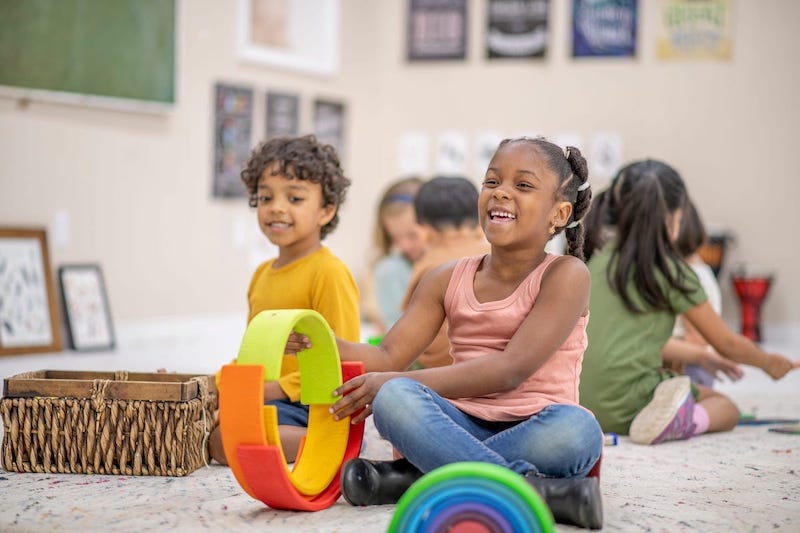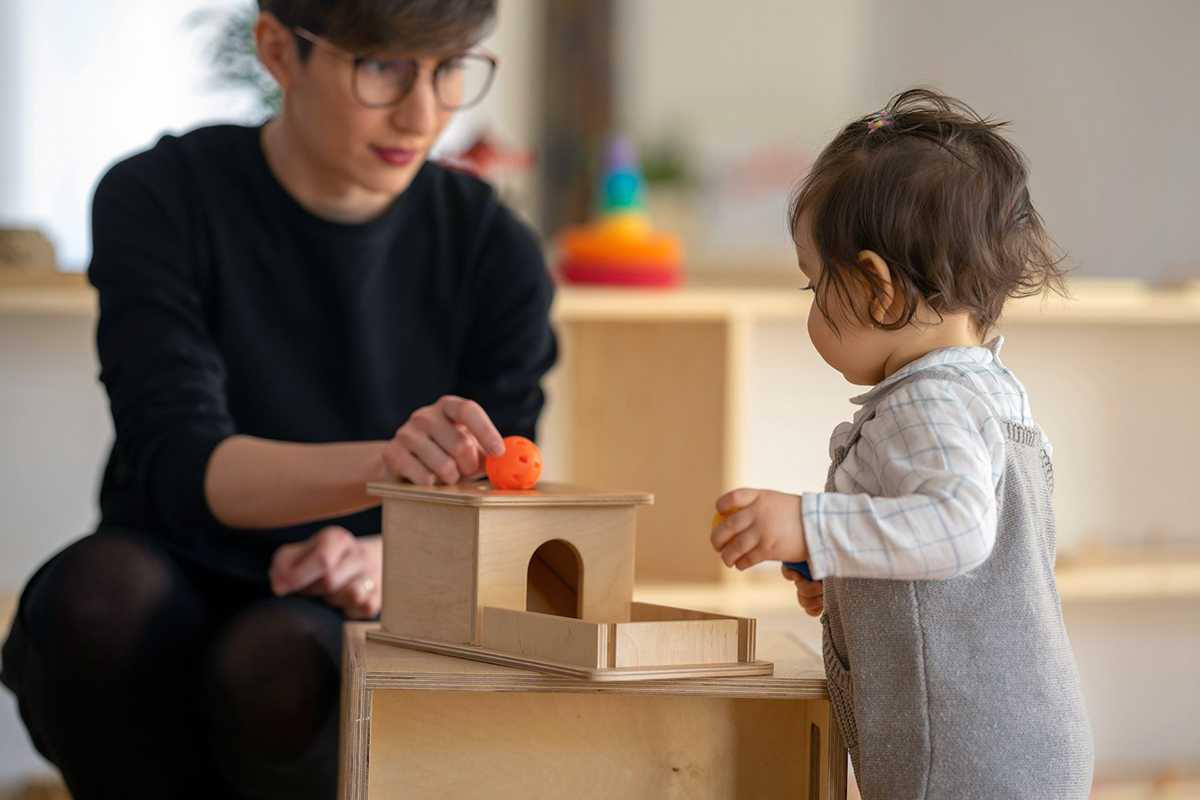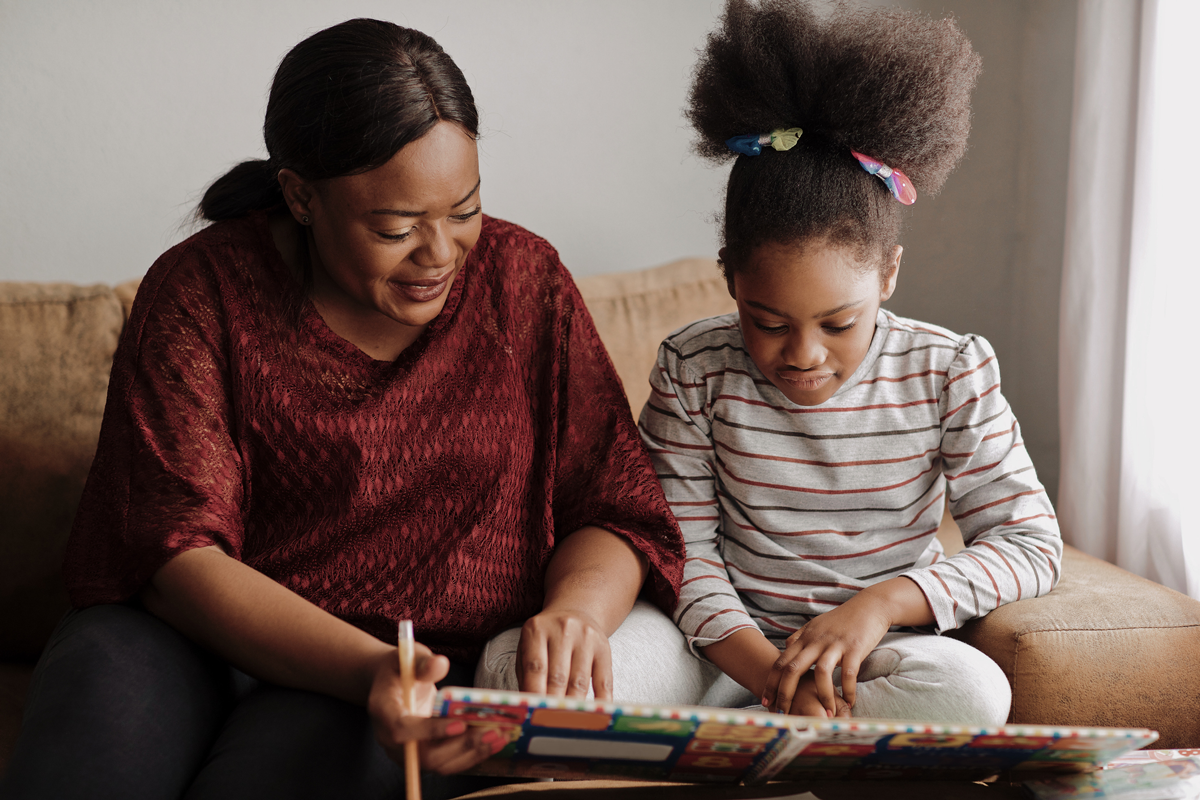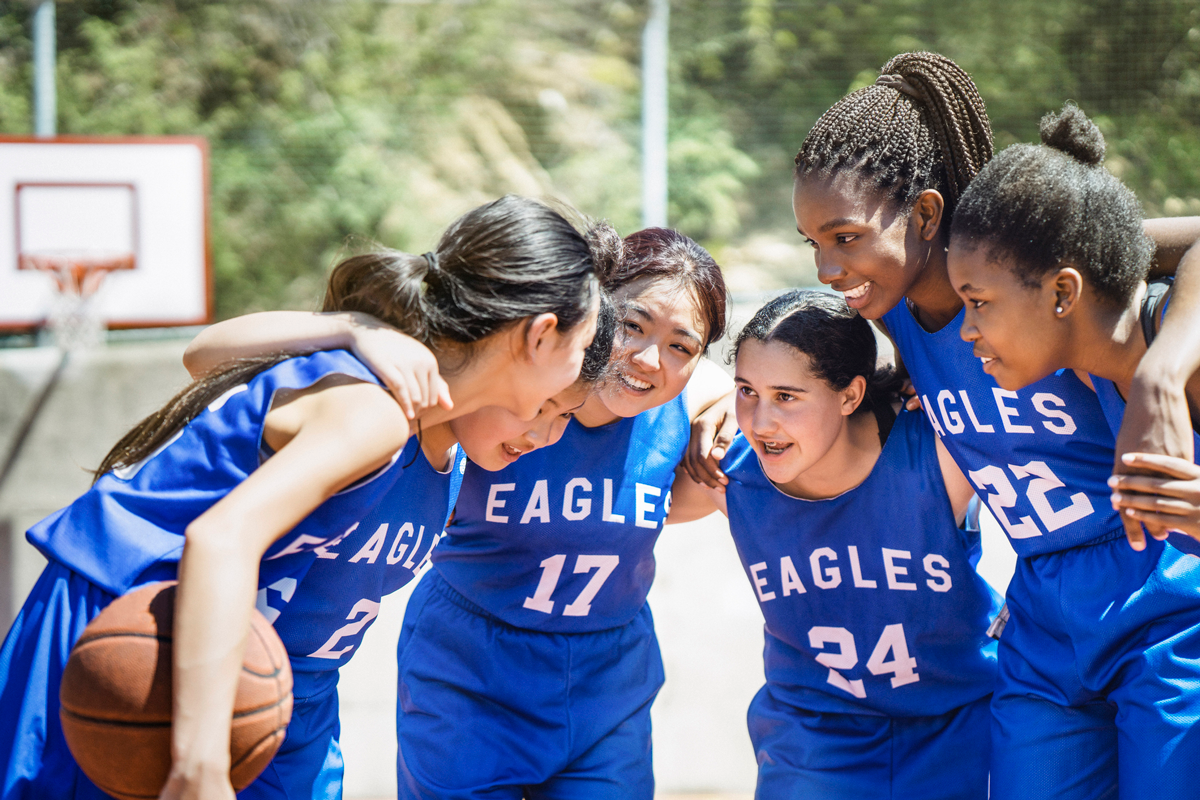Every preschool is slightly different. Your child’s preschool experience, if they have one, will be shaped mainly by the teachers in the classroom and to a lesser extent by the materials and structure. When researchers talk about preschool philosophy, though, there are at least four broad categories that are identified: Montessori, Reggio Emilia, Waldorf, and “traditional,” where the last one is just … everything else.
It is beyond the scope of this article to go into detail about all of these (this paper is a good overall reference), but in broad terms: Waldorf emphasizes engagement with the natural world; Reggio Emilia emphasizes play; Montessori emphasizes child-led task choice, multi-age classrooms, and a particular set of materials.

These approaches to education are not limited to preschool — there are Montessori and Waldorf schools for older ages too — though early childhood is where most people encounter them.
All three of these methods were developed in the early to mid-20th century in Europe. This context is relevant because they were largely developed in opposition to an experience of childhood that was, frankly, quite different from today. The Montessori idea of child-driven task choice was, in the early 1900s in Italy, radical. In many American households now, children already drive a lot of the choices.
Many people have asked me the question “Is Montessori school better?” (Or replace “Montessori” with whatever parenting philosophy you want.)
Today I’m going to start with a dive into the limited data. And then I’ll explain why, in fact, that question is unanswerable.
What is the data behind Montessori programs?
There is a very limited body of analytic research on school philosophy, and it mostly focuses on Montessori (not other approaches like Waldorf that I mention above). At the most basic level, there are papers that compare children who go to Montessori preschools with other children. This exercise is effectively meaningless given the differences across these groups. Yes, the kids who go to Montessori test better later, but they are also advantaged in all kinds of other, difficult-to-control-for ways.
There is one frequently cited paper that makes a stronger claim to causality. The paper, published in Science in 2006, used a randomized school lottery to evaluate the relationship between attending a Montessori school and student outcomes. (Families applied to an oversubscribed Montessori school; the paper compares children who ended up in the Montessori school with a set of lottery losers who did not.)
This paper finds some evidence of better phonics performance and executive function in 5-year-olds in the Montessori school. For example, the Montessori children performed better on a card sorting task. They also were less likely to be involved in physical aggression (such as “wrestling without smiling”) during recess. (I’m focused here on early schooling, but I will note that among the 12-year-olds, the paper did not find any differences in academic performance.)
However, despite the attention paid to it, the paper isn’t a slam dunk on the methods. First, the sample is small: there are only 25 5-year-olds in the Montessori group and 30 in the control group. Second, the authors’ empirical approach falls short of the typical randomized school lottery design.
In a standard school lottery design, researchers identify a set of applicants, observe their lottery results, and then compare the outcomes of the lottery winners with the lottery losers. They do this comparison regardless of whether the students attended the school they won the lottery for. The reason this is important is because it is the lottery outcome that is randomized — the ability to attend the school. Whether they actually choose to attend the school isn’t random.
This paper doesn’t do that; instead, it compares children who won the lottery and attended the school with those who lost the lottery and did not. This has an element of random variation but is actually not random, and the claim to causality is weak.
Perhaps better is this study, which compares children in French preschools who were randomly assigned to either Montessori or traditional classrooms. The authors find no differences in math, social skills, or executive function. They do find higher reading scores in the Montessori kids in kindergarten. The differences are small, the sample sizes are also small, and this is obviously a very specific situation.
I could go on. I could also dive into the even more limited research on Waldorf schooling. We have, for example, a dissertation that argues that students in Waldorf schools in Germany evince more “creative thinking” than their peers in traditional schools.
The overall picture is limited data-based evidence to point to anything in particular, and certainly nothing that would be obviously influential in any individual parent case.
However: the problem with our original question — “Is Montessori school better?” — is far bigger than the limited data.
Why it’s hard to define what “Montessori” actually means
The first issue in determining whether Montessori school is “better” is that it’s difficult to nail down a concrete definition of what Montessori is in the modern day. When Montessori was first introduced, it was totally unique — completely different from what had been done before. Maria Montessori was working with children in the slums of Italy in her school. The same is true of many of these other philosophies. Waldorf education was created for the children of factory workers in Germany, where we have to imagine the alternative education system was either nonexistent or limited in its creative pursuits.
At that time, it would have been easier to conclusively think about “Montessori” versus “other.” Over time, though, preschools (and schools in general) have adopted versions of all of these approaches. Many schools use Montessori materials. Many schools even have mixed-age classrooms, even if they are not explicitly linked to Montessori. Many schools engage with a lot of outside nature time, even if they are not explicitly Waldorf. Many preschools have a lot of free, child-driven play, even if they are not explicitly Reggio Emilia–linked.
This evolution means that it’s harder to think about preschools being in any particular bucket. It also means that any differences that might be there if everything was black and white are likely to be shrunk. Even if there is some difference between rigorously implemented Montessori and a classroom with no Montessori elements at all, the choice many parents face is closer to one classroom with more Montessori elements and one with less, but both with some.
Paradoxically, this factor could reverse any initial advantage. Imagine that Montessori is a collection of practices, some of which are really important and others that are less valuable or even negative. Over time, we might imagine the best practices will spill out into the wider world. It may then be that the better classrooms are the ones that are able to pick and choose. All of this is hard to evaluate empirically.
This means that when we ask “Is Montessori school better?” the concept of “Montessori school” is already very squishy.
How can you evaluate whether Montessori is better?
The second issue is in what we are evaluating. Kids of any age are going to learn what you focus on teaching them. With older kids, there is typically a set curriculum within a school. This makes it easier to talk about differences in achievement: everyone is supposed to learn a particular set of math skills, so it makes sense to ask if some approaches allow them to do so more effectively.
With young kids, though, there is much more variation in what we are trying to teach or accomplish. A different focus will lead to different outcomes.
For example, imagine I started a preschool focused on marine life. Everything we did would be oriented around understanding fish and octopuses and other sea creatures. At the end of two years in preschool, my students would know a lot about marine life and would (I venture) perform very well on a test about sea animals. However, they’d do very poorly on a test that was about letters or, say, land animals.
Relative to some other approaches, Montessori education emphasizes letters, and also sorting and categorizing tasks. One of the key papers cited above shows that 5-year-olds who have had this type of education are better at a card sorting task. This shouldn’t be surprising — they’ve been in an environment with a sorting task focus! Similarly, there is a paper above that shows that those in Waldorf education are more likely to think creatively. Again, this is what the method emphasizes, so it doesn’t seem surprising.
When we say “Is Montessori school better?”: “better” may simply be undefined. If your goal is letter recognition at age 5, Montessori could possibly have an edge. If your goal is nature knowledge, Waldorf might. For many of us, the goals of preschool are largely socialization — learning to exist in a classroom with others — fun, and child care. For that, the preschool might matter, but its philosophy isn’t likely to.
Closing thoughts
I think many of these same points could be applied to other questions of parenting philosophy. “Is attachment parenting better?” Bad question! What is attachment parenting? Is baby wearing enough? Do I also have to co-sleep? What’s the alternative? And similarly, what do we mean by “better”? If my goal is to have my child sleep in their own room, it’s not better. If my goal is to breastfeed for an extended period, maybe it is better.
In the end, as in much of parenting, the “Is this type of preschool better?” question is impossible to answer without first thinking about what you are trying to accomplish and what your family preferences and constraints are.
The bottom line
- Data behind schooling philosophies, and in particular Montessori methods, is limited.
- Over time, many schools have adopted elements of Montessori schools, which makes the concept of “Montessori” difficult to define.
- The goals of preschool are largely socialization — learning to exist in a classroom with others — fun, and child care. For that, the specific preschool might matter, but its philosophy isn’t likely to.
















Log in
I would caution about Waldorf schools, which are based on the occult philosophy of Rudolf Steiner, “Antroposophy”.
https://waldorfcritics.org/concerns/